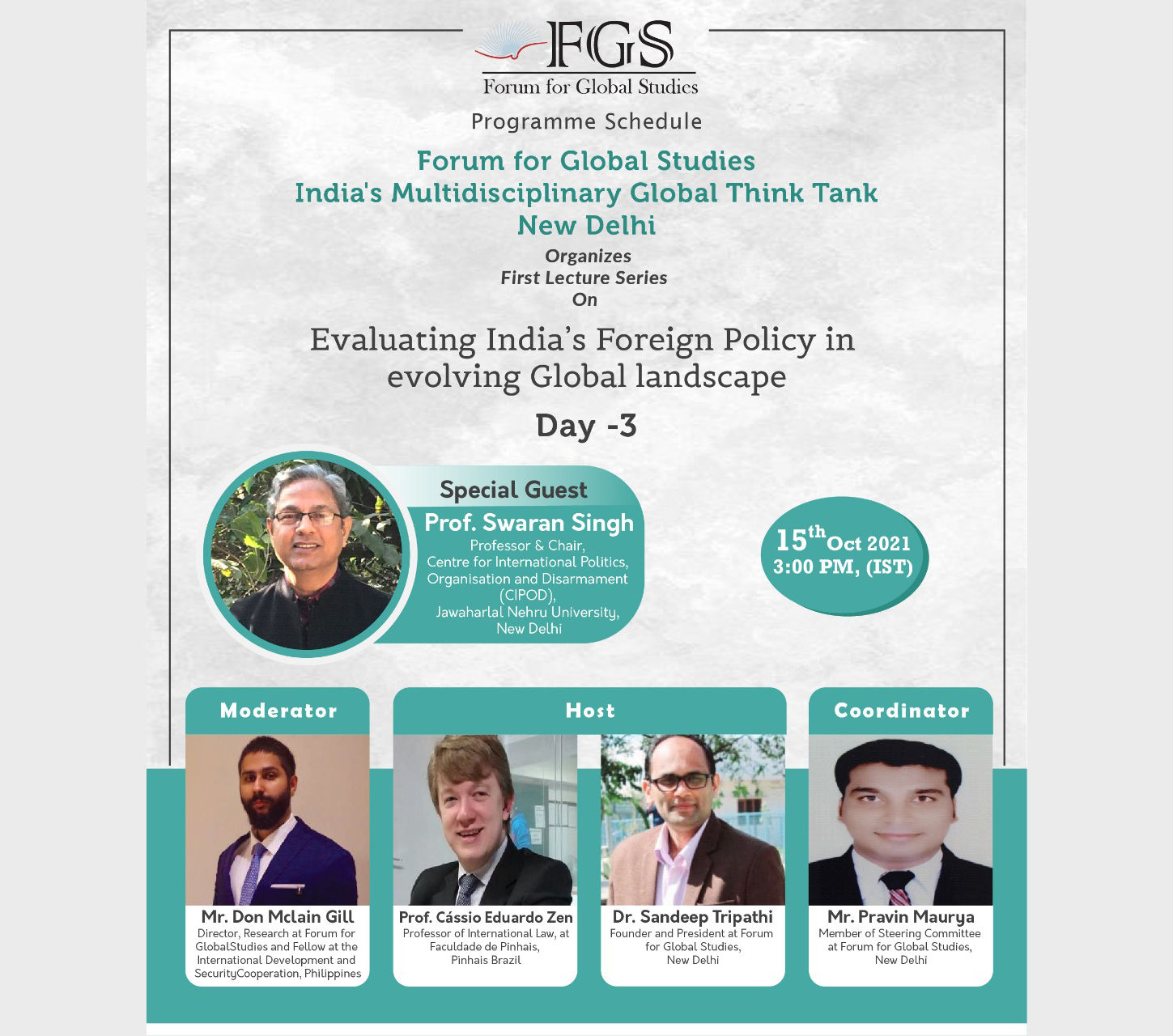The Forum for Global Studies, New Delhi, and a multidisciplinary global think tank organized First Lecture Series with a special guest, Prof. Swaran Singh, on the theme, ‘Evaluating India’s Foreign Policy in the Evolving Global Landscape’, held on 17th of October 2021. The programme started with the welcome speech delivered by FGS Founding President Dr Sandeep Tripathi. He extended a warm welcome to the distinguished guest, Prof. Swaran Singh, Professor and Chair, Centre for International Politics, Organisation and Disarmament (CIPOD), Jawaharlal Nehru University, New Delhi. The lecture was moderated by Mr Don Mclain Gill, Director, Research at Forum for Global Studies and Fellow at the International Development and Security Cooperation, Philippines. He also extended warm welcome to Prof. Swaran Singh and then the lecture was initiated. Prof. Swaran Singh provided important insights on the Indo-Pacific relations and predominantly discussed India’s engagement in the Indian Ocean. At the beginning of the lecture, Prof. Swaran Singh highlighted the emerging new areas of interest and engagement in the Indo-Pacific region due to the economic resurgence in the region. He elaborated extensively on the history of maritime connections and how over the years they are not only trade connections but also are culturally driven engagement.
Taking note of Indian politics, he described the shifts in Indian politics from one-family rule to para democracy now. He explained that in the region, India holds a sharp Look-East Policy and maintains healthy relationship with ASEAN countries for economic engagement. He highlighted how ASEAN is transforming and working actively to redefine post-cold war alignments in the region. Further, he elucidated on the significance of ASEAN and one of the advantages to the Indian nation was that it shares land borders with ASEAN countries. He also mentioned India as an attractive nation for countries such as Vietnam and Laos as they can rely on India for technology and trade. As he further explains, India in this manner is able to solidify its North-east relations and put emphasis that ASEAN may look new but is deeply rooted in civilisation traditions. However, he notes that the rise of Indo-Pacific region will continue to face the tension to tackle the unprecedented rise of China. Furthermore, he underlined India’s vision for the region laid out by Prime Minister Modi at the Shangri-La Dialogue in June 2018 in Singapore. Firstly, India do not wish to see the region militarised. Secondly, India wishes Indo-Pacific to be inclusive and bring Russia and China to the narrative. He also highlighted the shifts from SAARC to BIMSTEC, making India dominant in Bay of Bengal and India able to push on its own terms and consolidating the region. He further talks about aim and vision of India in the region that includes wealth creation, welfare promotion, and promoting cooperating win-win strategies. In the end, the lecture also provided some insight on other international summits such as QUAD, 5 EYES, and AUKUS. According to Prof. Swaran Singh these other international forums do not limit India instead India sees them as complimentary. He also indicates that countries in South Asia experience small state syndrome but civilisation wise we are all one-people. The programme was moderated by Mr Don Mclain Gill, who highlighted the role of India’s foreign policy in the region and its challenges complimenting the view of Prof. Swaran Singh. Dr Sandeep thanked Prof. Swaran Singh for the beautiful insights and for gracing FGS with his presence for the lecture series.

